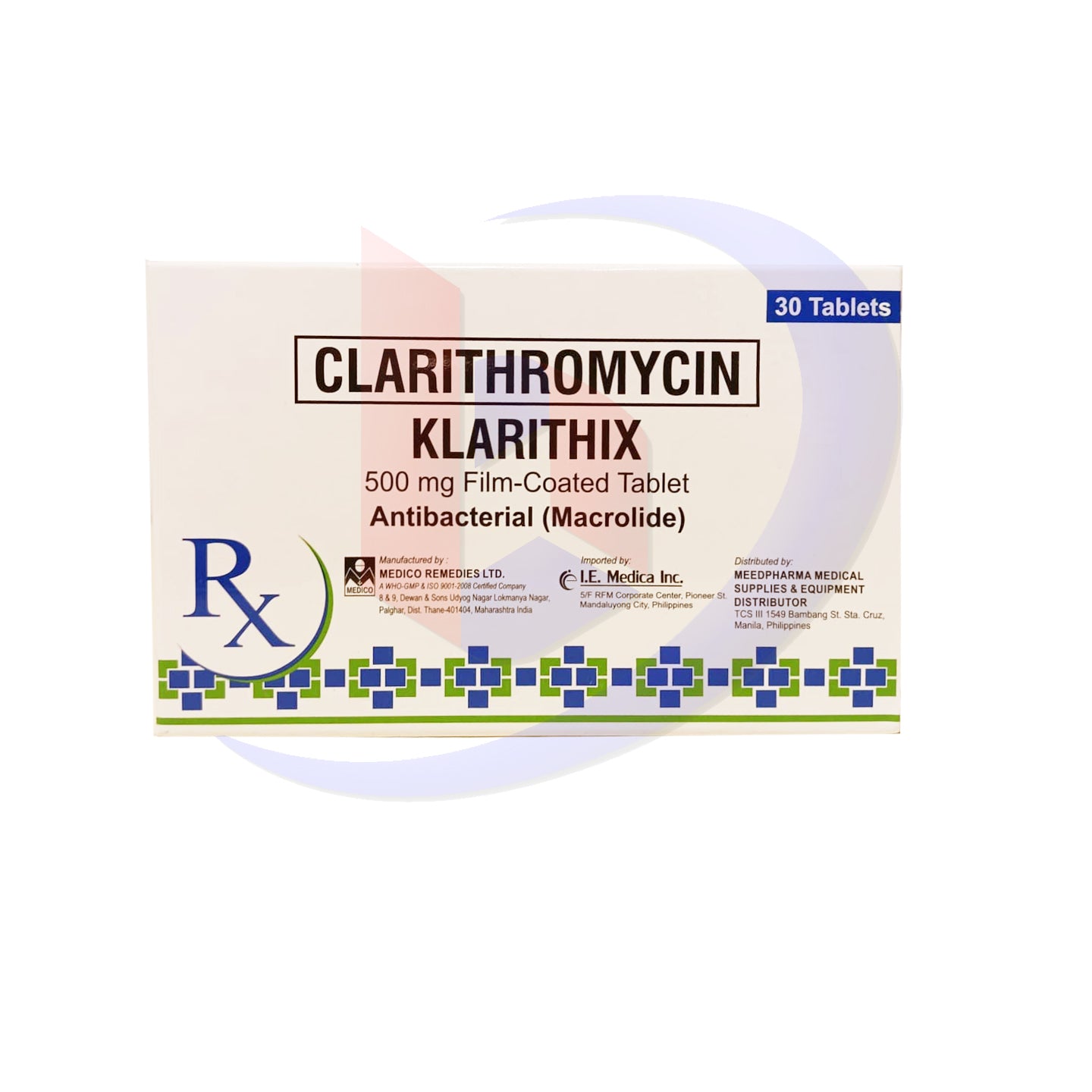Bambang Pharmaceutical Depot Inc.
Clarithromycin (Klarithix) 500mg Film Coated Tablet 30's
Clarithromycin (Klarithix) 500mg Film Coated Tablet 30's
Couldn't load pickup availability
Certainly! Below is the detailed information for Clarithromycin (Klarithix) 500mg Film-Coated Tablet 30's:
Product Description:
Clarithromycin (Klarithix) 500mg Film-Coated Tablets are an antibiotic used to treat various bacterial infections. Clarithromycin belongs to the macrolide class of antibiotics, which work by inhibiting the growth of bacteria. It is effective against a wide range of bacteria, including those causing respiratory, skin, and ear infections, as well as certain gastrointestinal infections.
Each tablet contains 500 mg of Clarithromycin, and the product is typically sold in a pack containing 30 film-coated tablets.
Indications:
Clarithromycin (Klarithix) is indicated for the treatment of the following conditions:
-
Respiratory Infections:
-
Community-acquired pneumonia (CAP)
-
Acute bacterial exacerbation of chronic bronchitis
-
Sinusitis (bacterial)
-
Pharyngitis and tonsillitis caused by susceptible organisms
-
-
Skin and Soft Tissue Infections:
-
Cellulitis
-
Impetigo
-
Skin abscesses
-
Soft tissue infections caused by susceptible bacteria
-
-
Helicobacter pylori Eradication:
-
In combination with other medications, it is used in the treatment of Helicobacter pylori infection to help prevent the recurrence of peptic ulcers.
-
-
Ear Infections:
-
Otitis media (middle ear infections)
-
Dosages:
The typical dosage of Clarithromycin (Klarithix) depends on the condition being treated and the patient's age. Here are the usual dosages:
-
For Adults (general infections):
-
Clarithromycin (Klarithix) 500mg is typically taken as 500 mg twice daily for 7 to 14 days, depending on the severity of the infection.
-
For severe infections, the dose may be increased to 1000 mg daily (500 mg twice a day).
-
-
For Helicobacter pylori Eradication (part of a combination therapy):
-
The usual dosage for Helicobacter pylori eradication is 500 mg twice daily, along with other antibiotics and medications as part of the combination regimen.
-
-
For Children:
-
The dose for children depends on their weight and the specific infection. For example, for children aged 6 months and older, the typical dose is 7.5 mg/kg twice daily (up to 500 mg per dose), but it’s essential to follow the pediatrician’s recommendations.
-
Note: If you miss a dose, take it as soon as possible, unless it's almost time for your next dose. Do not take two doses at the same time to make up for a missed dose.
Side Effects:
Clarithromycin (Klarithix), like all antibiotics, can cause side effects. Common and serious side effects include:
-
Common side effects:
-
Nausea
-
Vomiting
-
Diarrhea
-
Abdominal pain or discomfort
-
Taste disturbance (such as a metallic taste)
-
Headache
-
Dizziness
-
-
Serious side effects:
-
Allergic reactions: Swelling of the face, lips, tongue, or throat, rash, itching, or difficulty breathing (anaphylaxis).
-
Liver damage: Symptoms include yellowing of the skin or eyes (jaundice), dark urine, or persistent stomach pain.
-
QT prolongation: Clarithromycin can affect the heart's rhythm, potentially causing serious heart-related issues like arrhythmias (abnormal heartbeats).
-
Hearing loss: This can occur in some patients, especially those with pre-existing kidney problems or who are on prolonged therapy.
-
Severe gastrointestinal symptoms: Including persistent vomiting or diarrhea, which may indicate a Clostridium difficile infection.
-
-
Rare but serious effects:
-
Pancreatitis (inflammation of the pancreas), marked by severe abdominal pain.
-
Severe skin reactions: Rash, blistering, or peeling skin.
-
Renal dysfunction: Patients with pre-existing kidney problems should be monitored for any worsening symptoms.
-
Contraindications:
Clarithromycin (Klarithix) is contraindicated in the following conditions:
-
Hypersensitivity: If you are allergic to Clarithromycin, other macrolide antibiotics (such as erythromycin or azithromycin), or any of the ingredients in the medication.
-
Liver Disease: Clarithromycin should be avoided or used with caution in patients with severe liver impairment or liver disease.
-
Drug Interactions: Clarithromycin should not be used with certain medications, such as:
-
Ergotamine or dihydroergotamine (used for migraines)
-
Pimozide (an antipsychotic medication)
-
Terfenadine or astemizole (antihistamines)
-
Cisapride (used for gastrointestinal motility disorders)
-
Certain antifungals, such as ketoconazole or itraconazole
-
Some antiarrhythmics such as quinidine or amiodarone due to the risk of serious heart rhythm disturbances (QT prolongation)
-
-
Pregnancy: Clarithromycin should be used during pregnancy only if the potential benefit justifies the potential risk to the fetus (Category C). It is generally not recommended during the first trimester.
-
Breastfeeding: Clarithromycin is excreted in breast milk, so it should be avoided in breastfeeding mothers unless deemed necessary by a healthcare provider.
-
Kidney Disease: Clarithromycin is contraindicated in patients with severe kidney dysfunction. In patients with moderate kidney impairment, the dosage should be adjusted.
Warnings and Precautions:
-
QT Prolongation: Clarithromycin can affect heart rhythm, leading to QT prolongation, which can increase the risk of life-threatening arrhythmias. Patients with heart problems or those taking medications that affect the heart’s rhythm should be monitored closely.
-
Liver Function: Liver function tests should be monitored in patients with pre-existing liver conditions or those who develop symptoms of liver toxicity.
-
Clostridium difficile-associated Diarrhea (CDAD): As with other broad-spectrum antibiotics, Clarithromycin may disrupt the normal gut flora and lead to Clostridium difficile-associated diarrhea, which can be severe and potentially fatal. If diarrhea is persistent or severe, especially with blood or mucus, medical advice should be sought.
-
Superinfection: Prolonged use of Clarithromycin can lead to the overgrowth of non-susceptible organisms (such as fungi). If new infections occur, treatment may need to be adjusted.
-
Renal Function: In patients with renal impairment, the dose of Clarithromycin should be adjusted accordingly to prevent toxicity.
Storage:
-
Store Clarithromycin (Klarithix) at room temperature, away from moisture, heat, and direct sunlight.
-
Keep out of reach of children.
Important Note: Always follow the prescribed dosage and consult with your healthcare provider if you experience any new or unusual symptoms. Do not take antibiotics unnecessarily, as overuse can lead to antibiotic resistance.
Share

Product Features
Highlights
Details
Lot #
Expiry Date
"For All Your Pharma And Medical Supply Needs"
-
MEDICINES
We offer large range of generics and branded tablets, capsules, topicals, suppositories, drops or suspensions, inhalers and injections.
-
SUPPLEMENTS
High quality yet very affordable vitamins and minerals, specialty supplements, herbals and botanicals, sports nutrition, and weight management.
-
MEDICAL SUPPLIES
We serve all types of medical supplies needed in clinics, laboratories, and hospitals like cottons, gauze, alcohol, swabs, gloves, bandages, lancets, glucometer, etc.
-
MEDICAL EQUIPMENT
We also serve durable and affordable medical devices and equipment needed in clinics, laboratories and hospitals.
Subscribe to our emails
Be the first to know about new collections and exclusive offers of Bambang Pharmaceutical Depot Inc.


